Google Pixel 8 Pro review – fresh looks and an industry first may set it apart
Google Pixel 8 Pro preview: Two-minute review
Over the years there’s been conjecture that Google isn’t that committed to the smartphone space, and that maybe it just builds handsets to encourage innovation in Android partners. But since the launch of the Pixel 6, and even more so now with the new Pixel 8 Pro, it’s clear that Google is serious, and eager to compete.
The new Pixel 8 Pro, like the new Pixel 8, hews closely to its predecessor’s design aesthetic. But, as others phone makers have done this year, Google has smoothed things out a bit, evolving the design so that it’s both recognizable yet clearly different in look and feel.
Pixel phones remain an acquired taste when it comes to looks. The bold metal camera housing band is nothing if not distinct from all other smartphone brands; it cries out: “This is a Pixel! Get used to it.” Still, the newly curved corners soften the appearance and, as on Apple and Samsung devices, make even the largest handset a pleasure to hold.
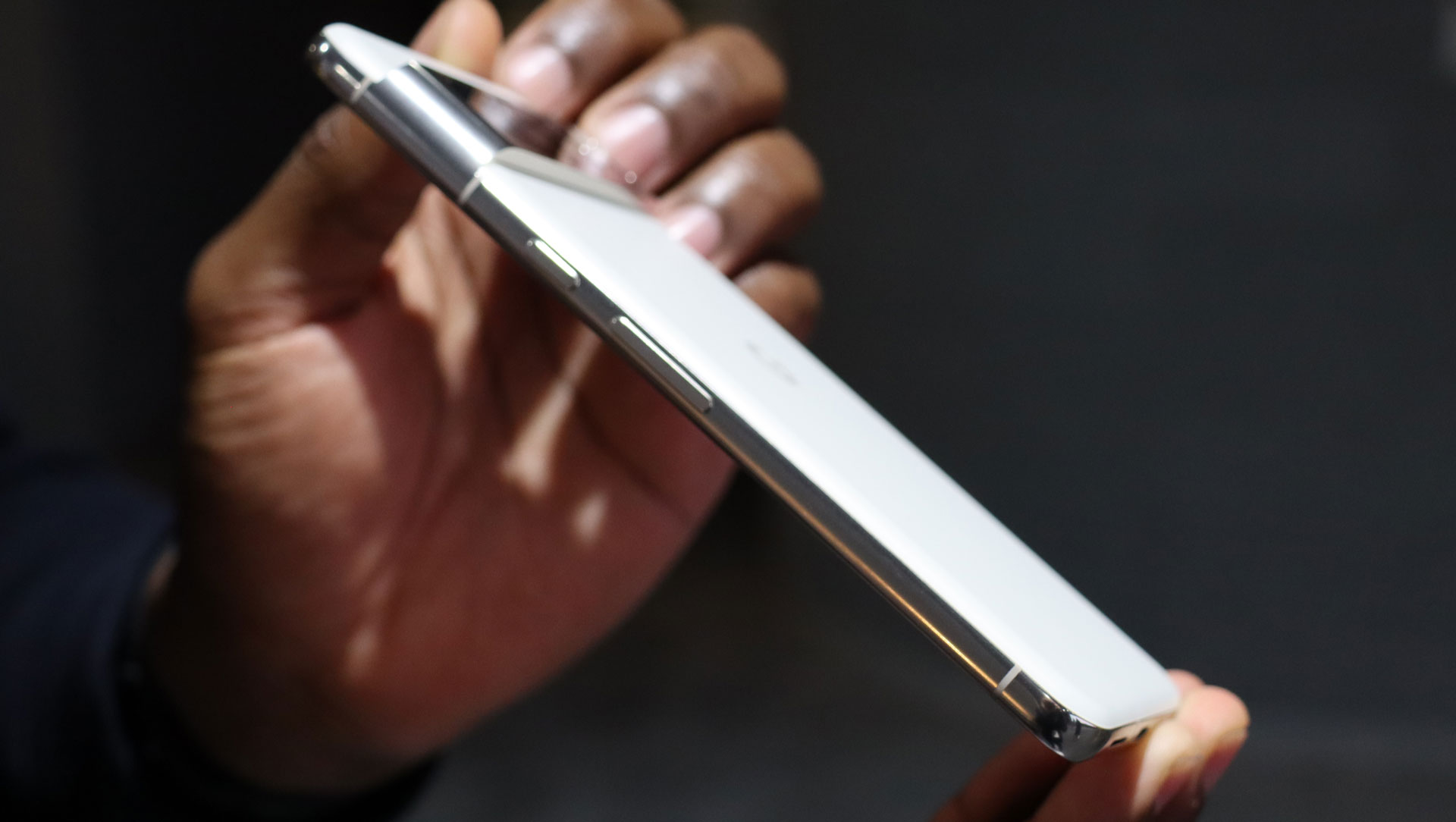
However, it’s not the look of this new phone that will help the Pixel 8 Pro make its mark, it’s what’s inside: a combination of a brand-new Tensor G3 processor, AI magic, and a trio of new, more powerful cameras could set the Pixel 8 Pro apart from this year's iPhones and Galaxys.
Added to these design and component changes is something new, if not unique among consumer phones: an onboard temperature sensor, which shares space with the trio of lenses on the camera array’s metal band.
I didn’t get a lot of time with the new phone, but it was enough to see where Google is going here, and understand the essence of its modern Pixel approach.
Google Pixel 8 Pro preview: Price and availability
- Priced from $999 / £999 / AU$1,699
- Pre-orders live now
- On sale from October 12
Google unveiled the Pixel 8 Pro and Pixel 8 at its October 4 Made by Google event, at which it also launched the Pixel Watch 2.
The Pixel 8 Pro starts at $999 / £999 / AU$1,699, while the Pixel 8 starts at $699 / £699 / $1,199. Preorders started October 4, and the phone ships from October 12.
Of course, if you've heard enough and are ready to adopt Google Pixel 8 Pro as your own personal flagship, you'll want to check out our Google Pixel 8 Pro deals roundup – we're constantly updating it with the best offers available.
Google Pixel 8 Pro preview: Design
Here's how the Google Pixel 8 Pro compares specs-wise to the Google Pixel 8 and Apple's iPhone 15 Pro Max.
Google Pixel 8 Pro preview: Design
- Softer but familiar look and feel
- Relatively lightweight
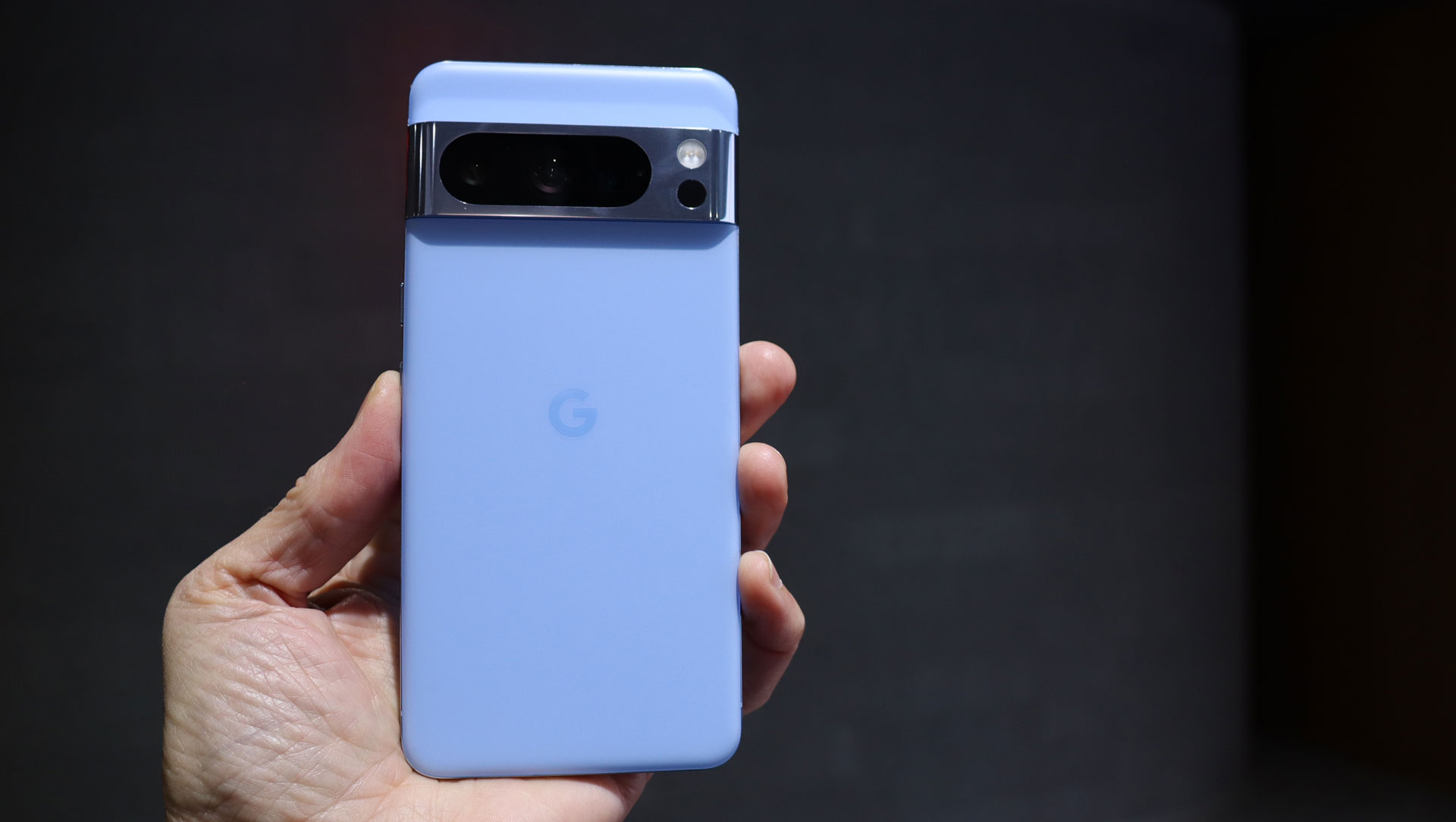
I didn’t like the Pixel 6 design – the two-toned back and glass camera band looked awkward. The Pixel 7 Pro remedied those issues, adopting a single color for the rear and a metal camera band, and now the Pixel 8 Pro has achieved a new level of refinement. There are more pleasing colors this year, including my favorite, Bay, which is sort of sky blue – the other options are Obsidian (black) and Porcelain (off-white). Considering the phone's dust and water-defeating IP68 rating, 'Bay' may be an appropriate color name.
Covering the screen and back is Corning Gorilla Glass Victus. The polished aluminum frame is all curved around the edges, making the phone feel pleasant in the palm. Even though the sides curve, the screen is completely flat, a choice I applaud.
Button placement looks unchanged and, as usual, there’s the USB-C charge port on the bottom. While the camera supports eSIM technology, the 5G phone still has a SIM slot for traditional nano SIM cards.
The metal band houses the three cameras, a flash, and the new temperature sensor.
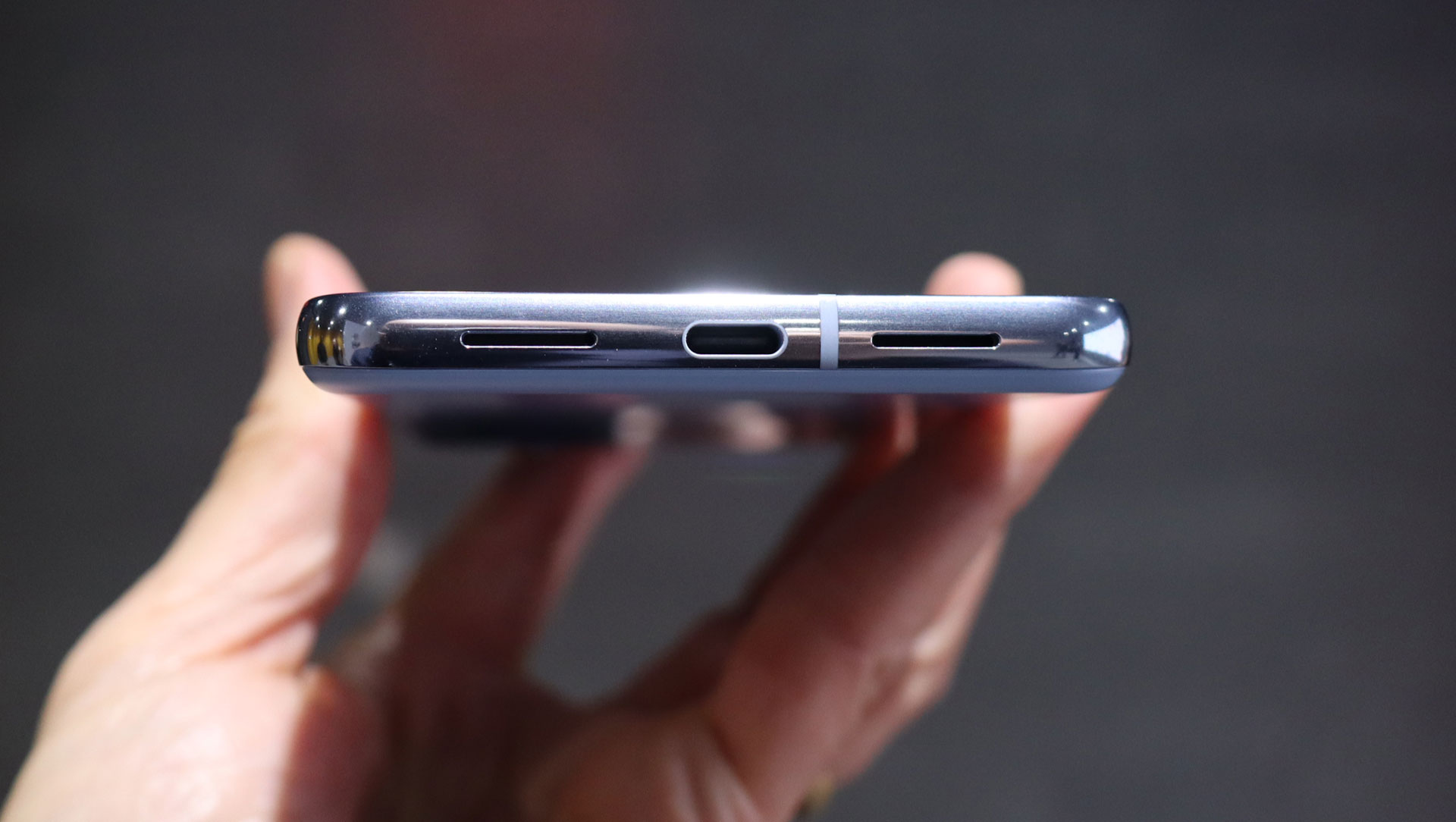
I’ve never seen a phone with a thermometer before, but here we are. It looks like another camera, but rather than taking pictures, you point it at something and get the surface temperature. Using it was easy enough – I pointed the sensor at something, opened the new Temp app, hit a button, and the app displayed the temperature. I could quickly take another reading by hitting the refresh button.
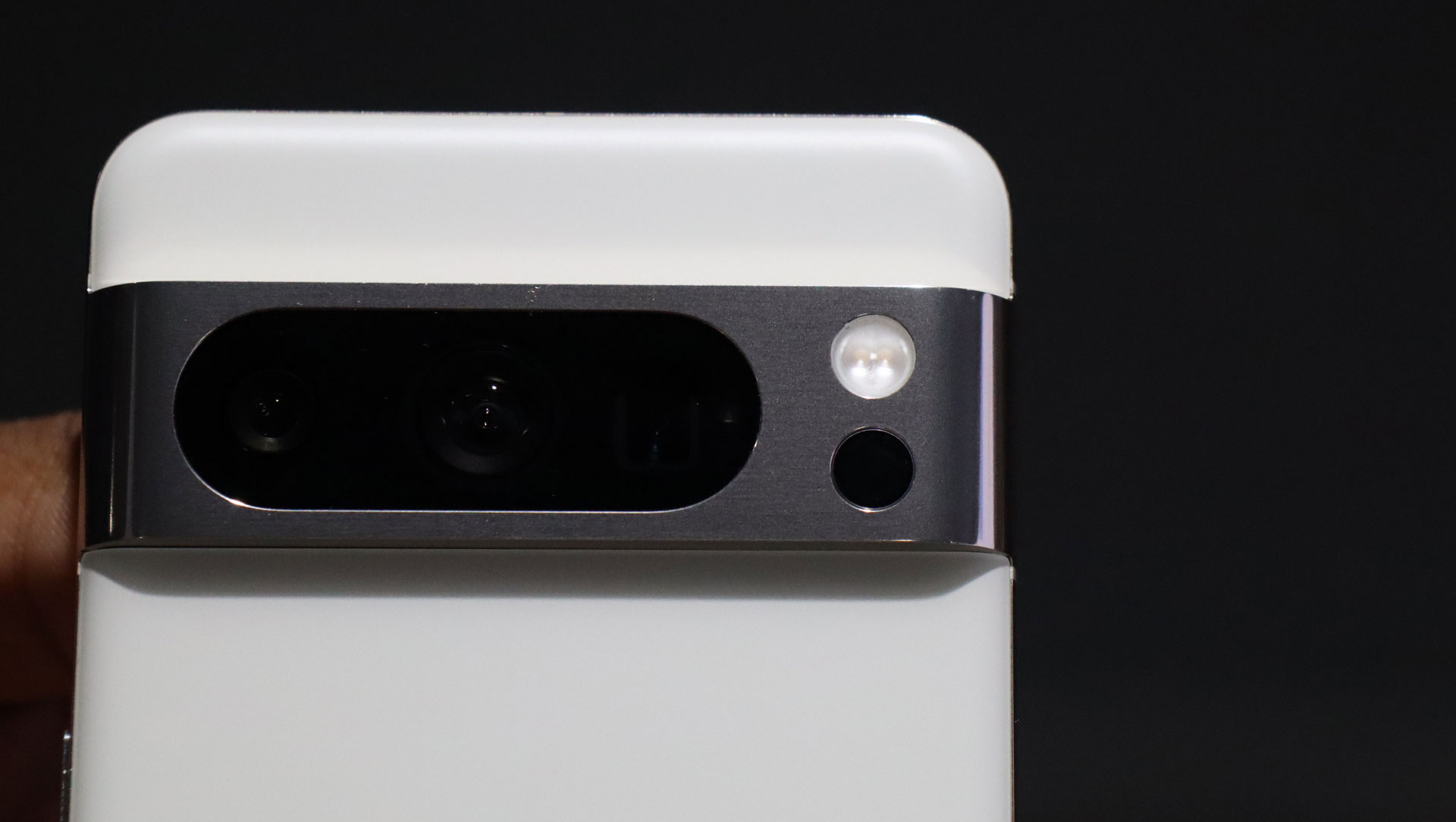
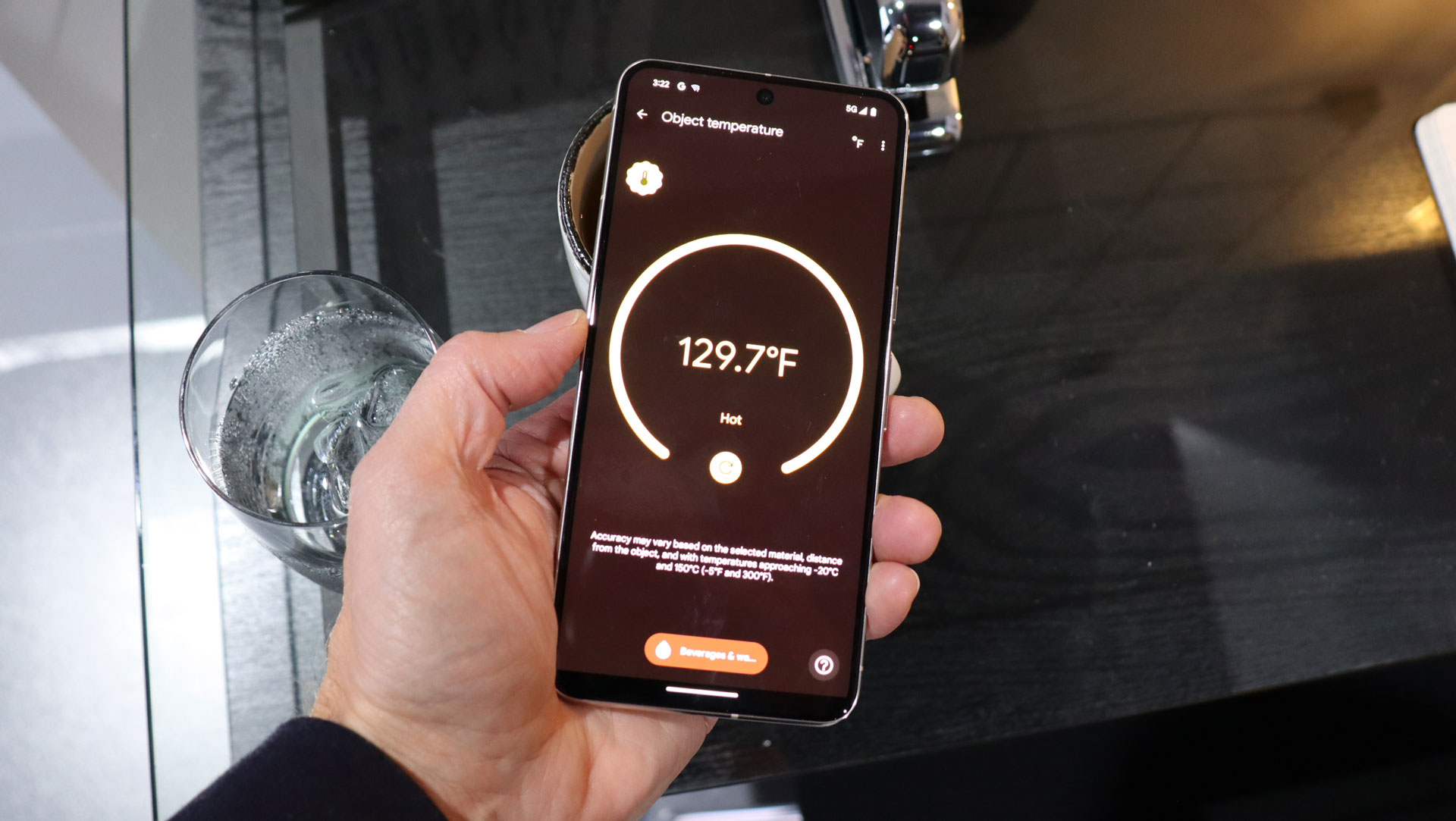
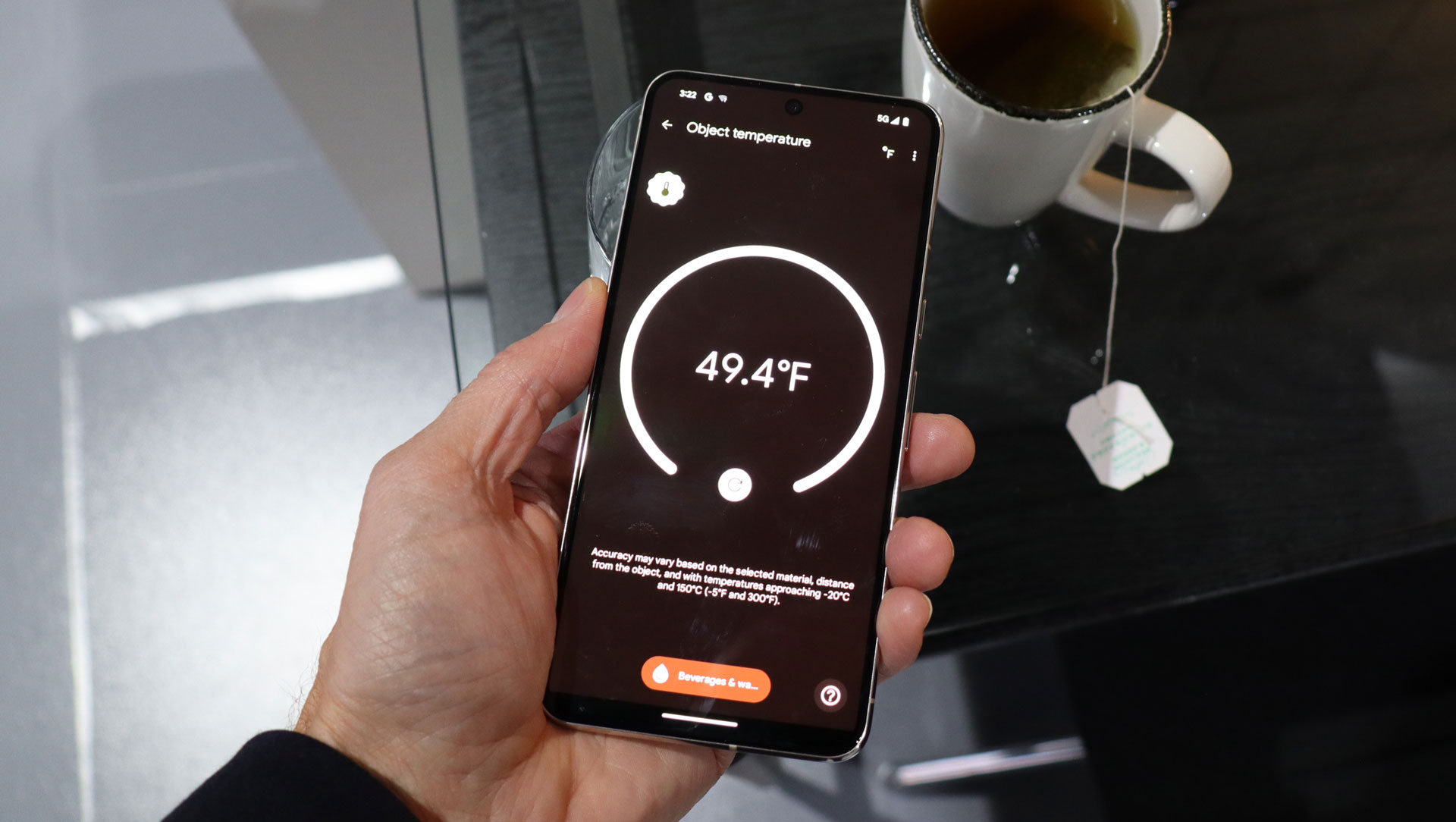
It seems to work best when within a few inches of your measurement subject. We held it over a glass of cold water and got a reading of around 39 degrees Fahrenheit, and then over a cup of tea that measured almost 130F.
Google is working on getting FDA approval to use this new sensor to measure human skin temperature. It looks like it can take the ambient temperature, too.
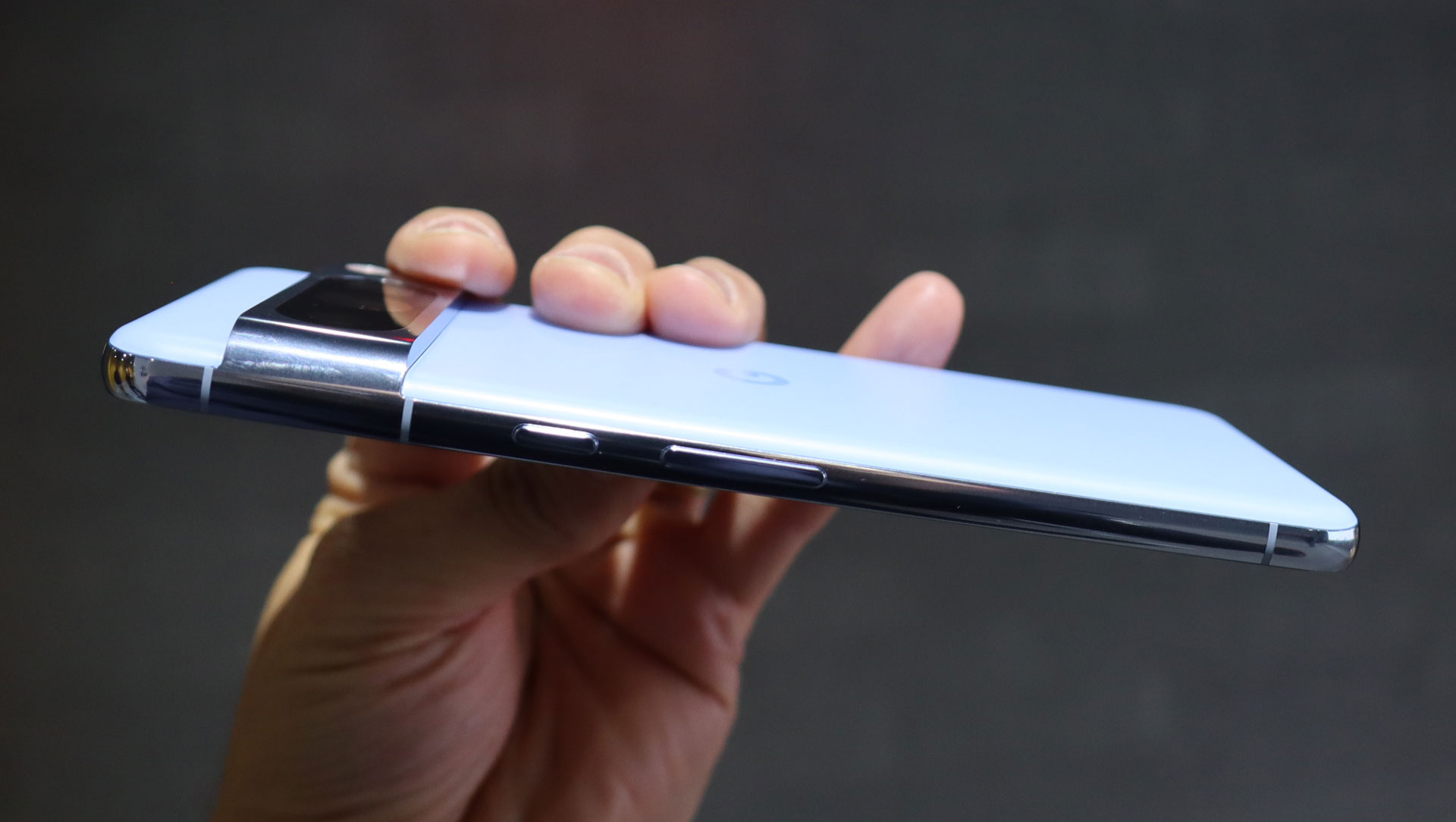
When we initially tried to take the temperature of the tea, the Google rep inadvertently held the phone so the sensor wasn’t positioned right over the cup, and it ended up measuring the temperature around the cup. I can’t decide if this sensor is an unnecessary gimmick or potentially useful. (Pixel is the same phone brand that once had a built-in radar for detecting in-the-air gestures.)
Google Pixel 8 Pro preview: Display
- 6.7-inch 1344 x 2992 flat OLED display
- Adaptive refresh rate going from 1Hz to 120Hz
- 42% brighter than 7 Pro, with a peak brightness of 2,000 nits
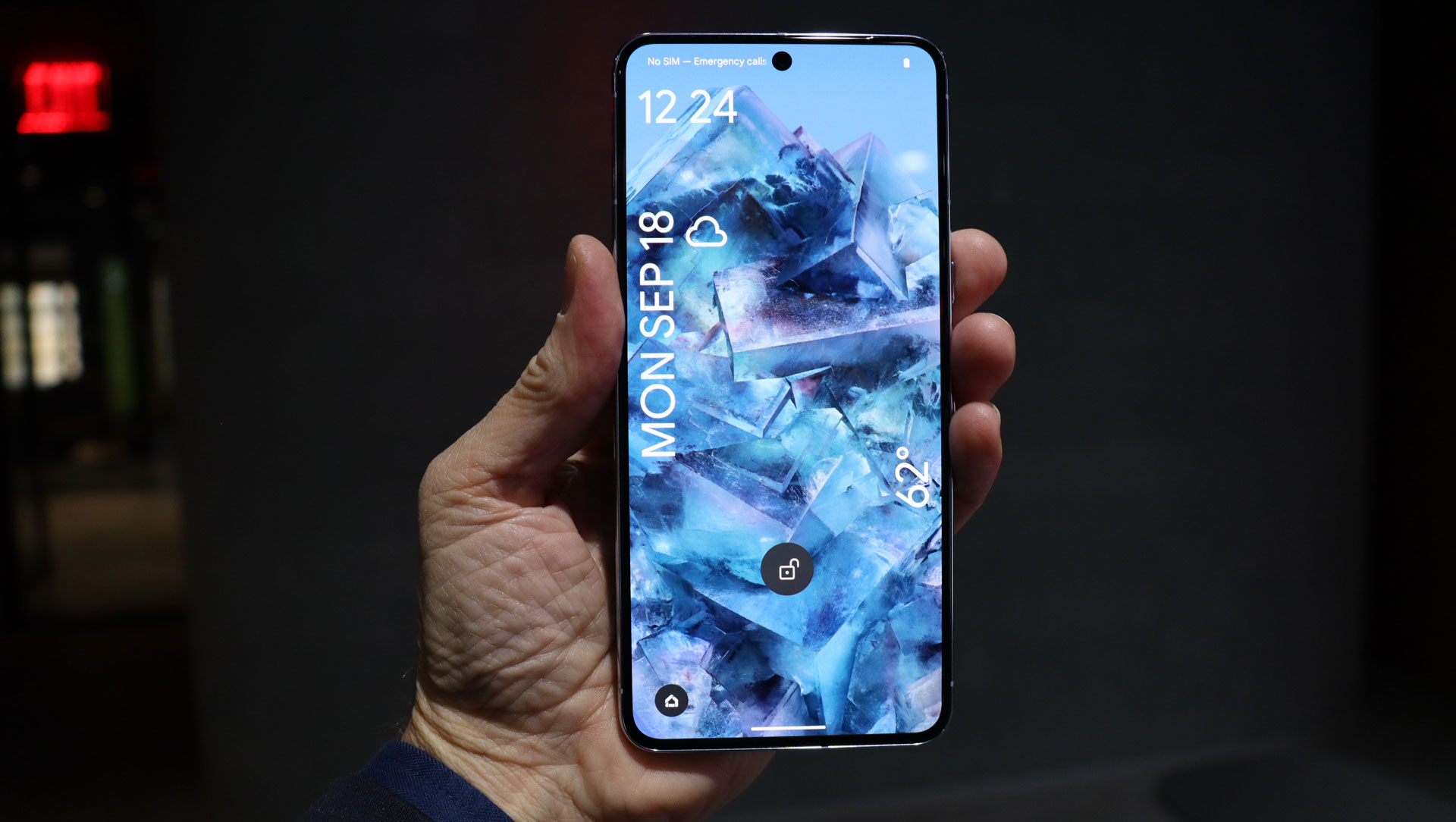
Google has given the Pixel 8 Pro display, which is still a 6.7-inch LPTO OLED panel, a nice brightness upgrade – it claims the screen is 42% brighter that the Pixel 7 Pro's, and it's rated for up to 2,000 nits at peak brightness. I only saw the phone indoors, so it’s hard to judge. The bezels are narrow, but no more so than on the 7 Pro. There’s still the display cut-out for the front-facing camera.
That camera, by the way, gets an update with autofocus. And Google said the face unlock system meets a high enough biometric standard that it can now be used to authenticate payments made through the phone.
The variable refresh rate now ranges from 1Hz to 120Hz. That’s an improvement over the Pixel 7 Pro, which could only stop down to 10Hz. So you’ll see better always-on performance and, perhaps, a small uptick in battery life.
Under the display is a fingerprint reader that I did not get to try out.
Generally, I liked the look of the display. It’s bright, colorful, and responsive.
Google Pixel 8 Pro preview: Cameras
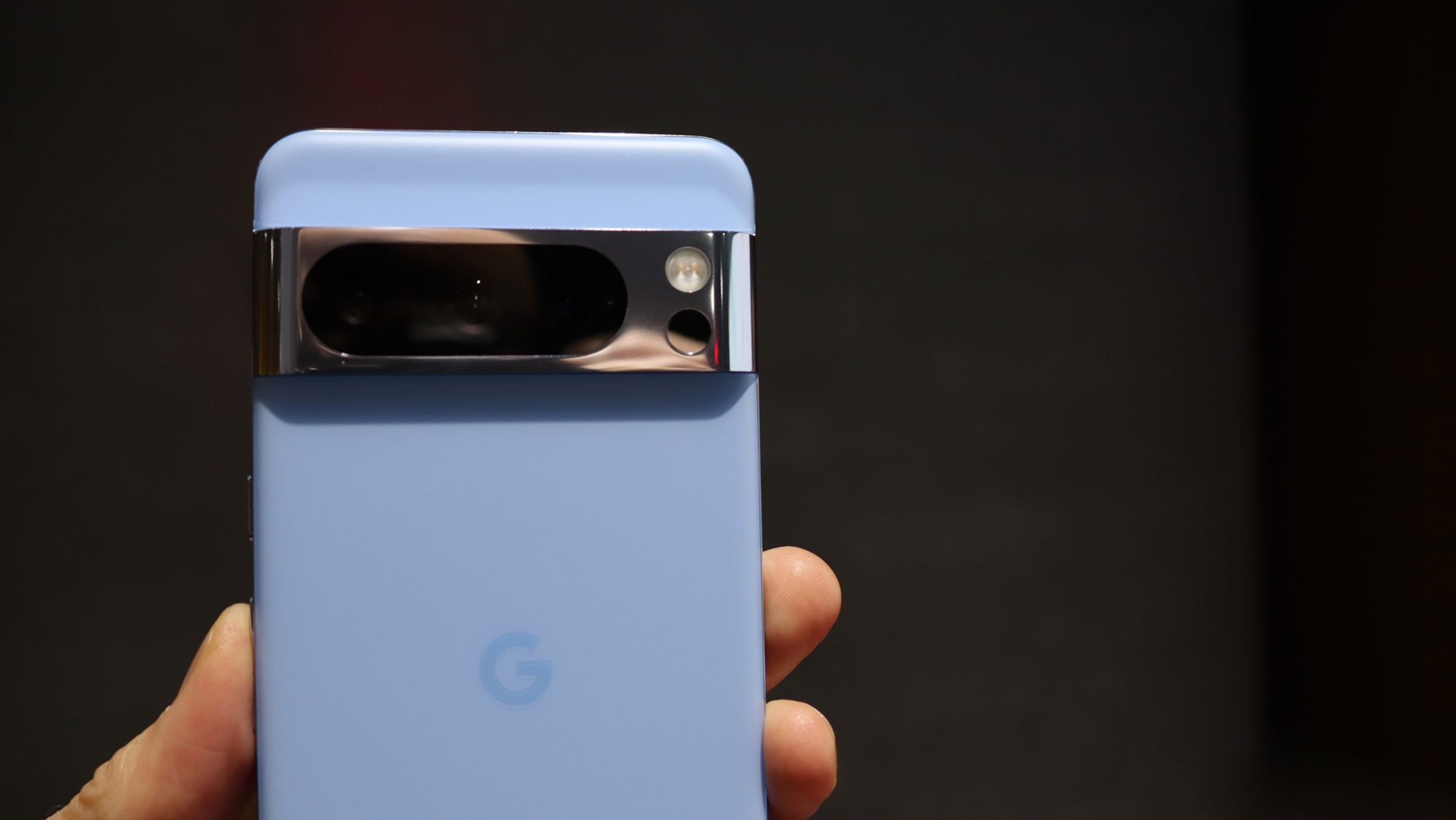
Let’s just say that Google has gone a bit wild on the camera side. In addition to the 50MP main camera, both the ultrawide and 5x telephoto are 48MP. I would expect that all will shoot at a binned 12MP by default, but with that many megapixels to work with across the board we should see even better Google Pixel photography.
Here are the cameras:
- Main: 50MP f/1.68
- Ultrawide: 48MP f/1.95
- Telephoto: 48MP f/2.8
- Front-facing: 10MP f/2.2
I didn’t get to shoot any photos but did see the new macro capabilities at work and they look impressive – you can get within two centimeters of your subject and achieve startling detail and quality. Elsewhere, the front-facing camera gets an update with the addition of autofocus.
Google has redesigned the Camera app with a new layout and access to more pro-level tools. As you would expect from Google, AI is employed throughout the phone, and it's used to impressive effect in photos.
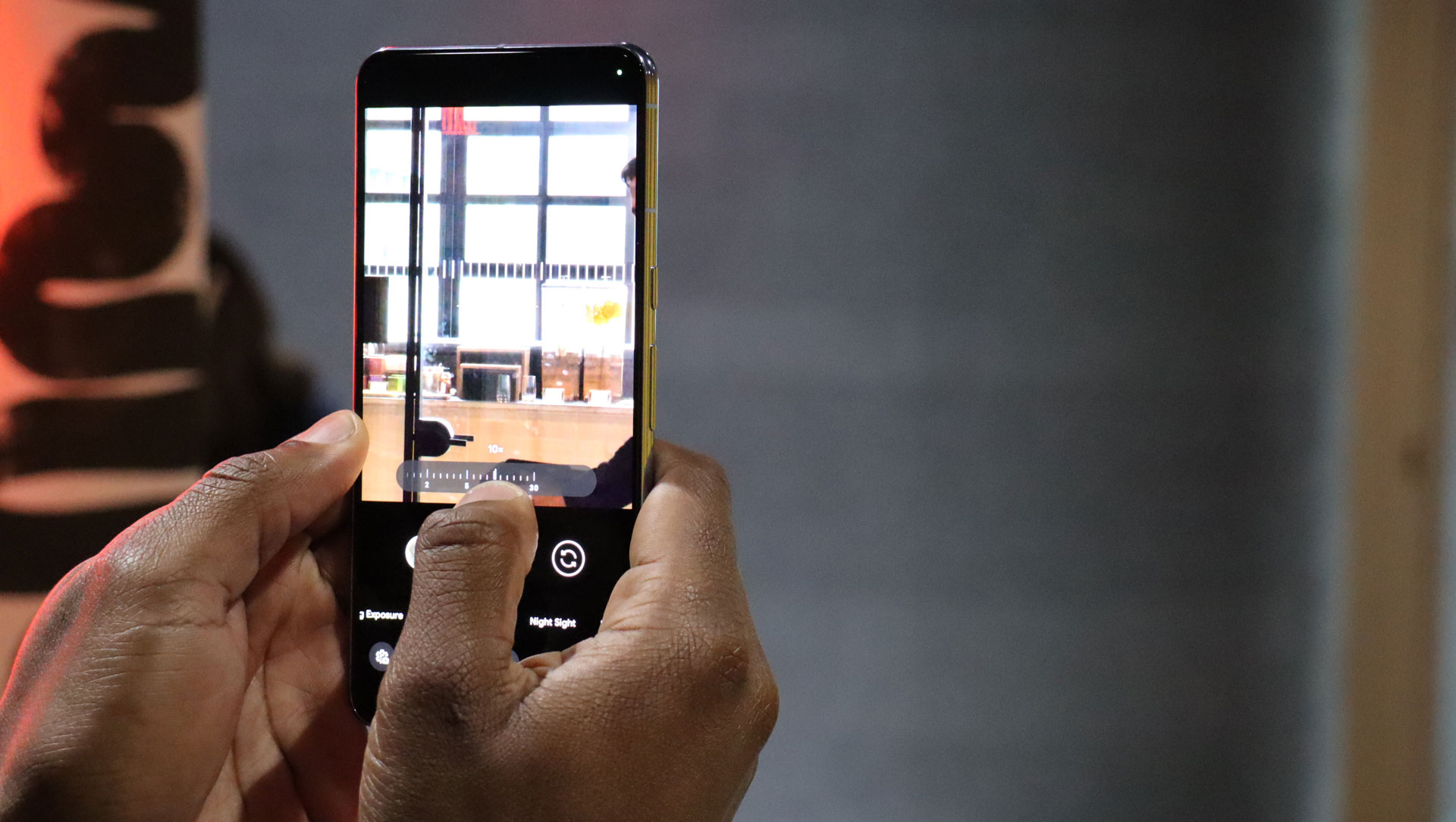
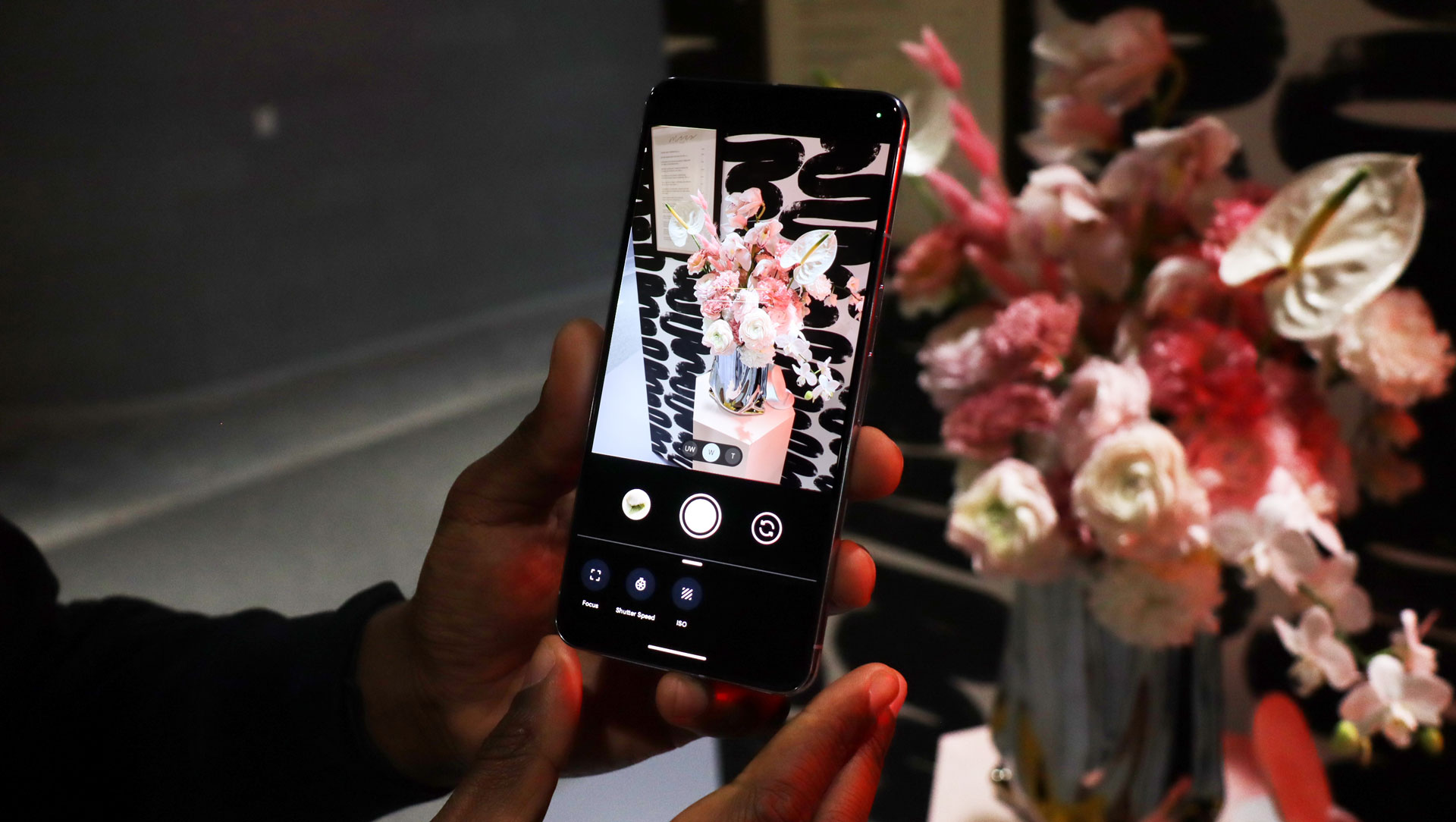
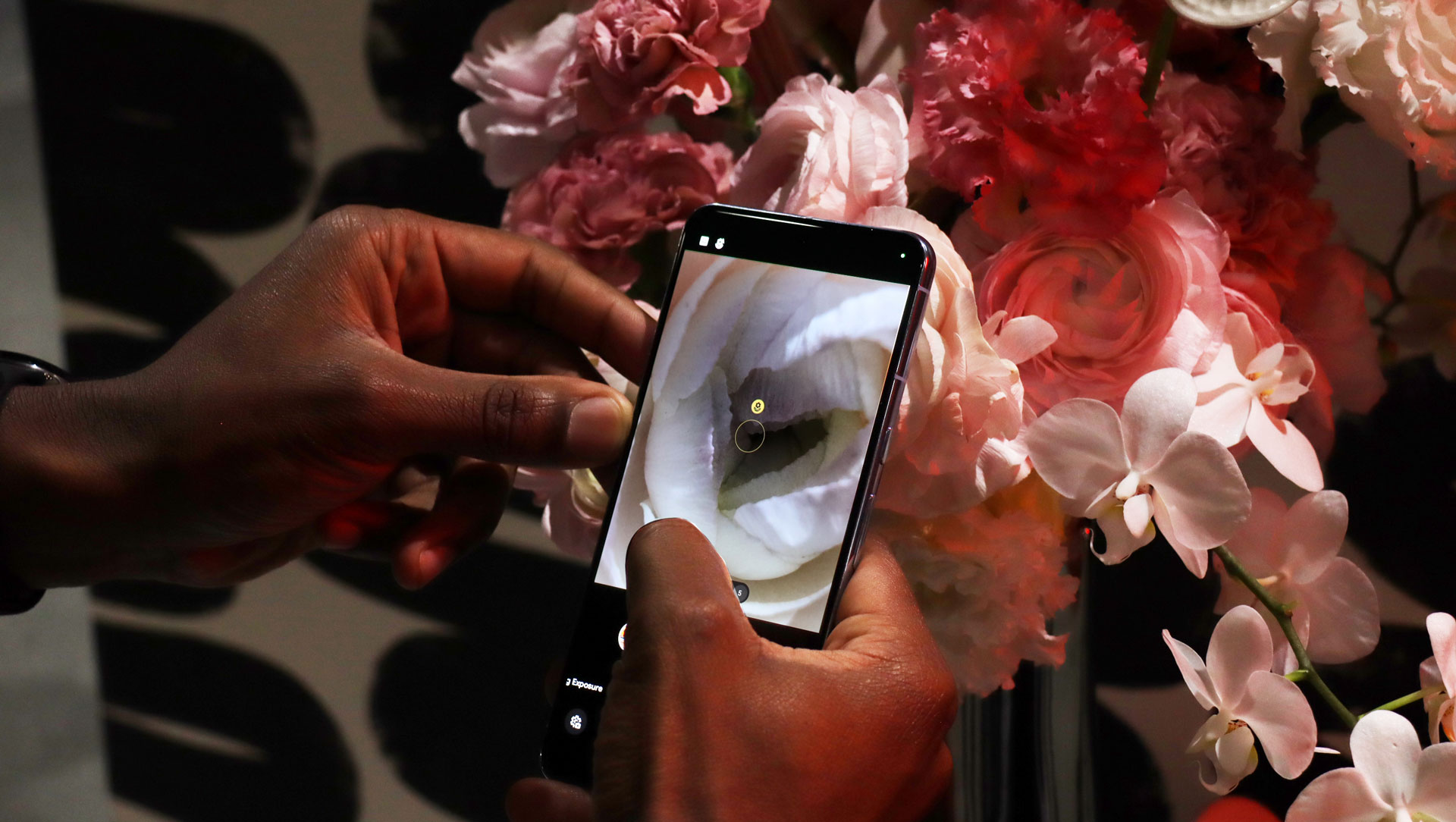
Magic Editor lets you tap and drag on a subject in a photo to move it, and the AI will then process and intelligently fill in the space left behind. I watched as a Google exec opened a photo of his son shooting a basketball, tapped on his son, and moved him to within inches of the basket so it looked like he was performing a dunk. The exec told me that while the boy's shadow was now out of place, he could use Magic Editor to move it, too.
In a similar fashion, Best Take can analyze a series of photos taken in succession and, with your guidance, find the best expression for each person across all the images and create one photo in which everyone is looking at the camera and smiling – it's impressive, if perhaps a little disconcerting.
Video, which you can shoot at up to 4K at 60fps, gets an upgrade as well, with Google processing every frame of video through its HDR pipeline for better low-light performance. There’s even a new Audio Eraser to help you remove distracting noises from your videos.
It looks like Google has done a lot of work on its cameras, although at this stage it’s too early to say whether the Google Pixel 8 Pro will take a spot as one of our best camera phones.
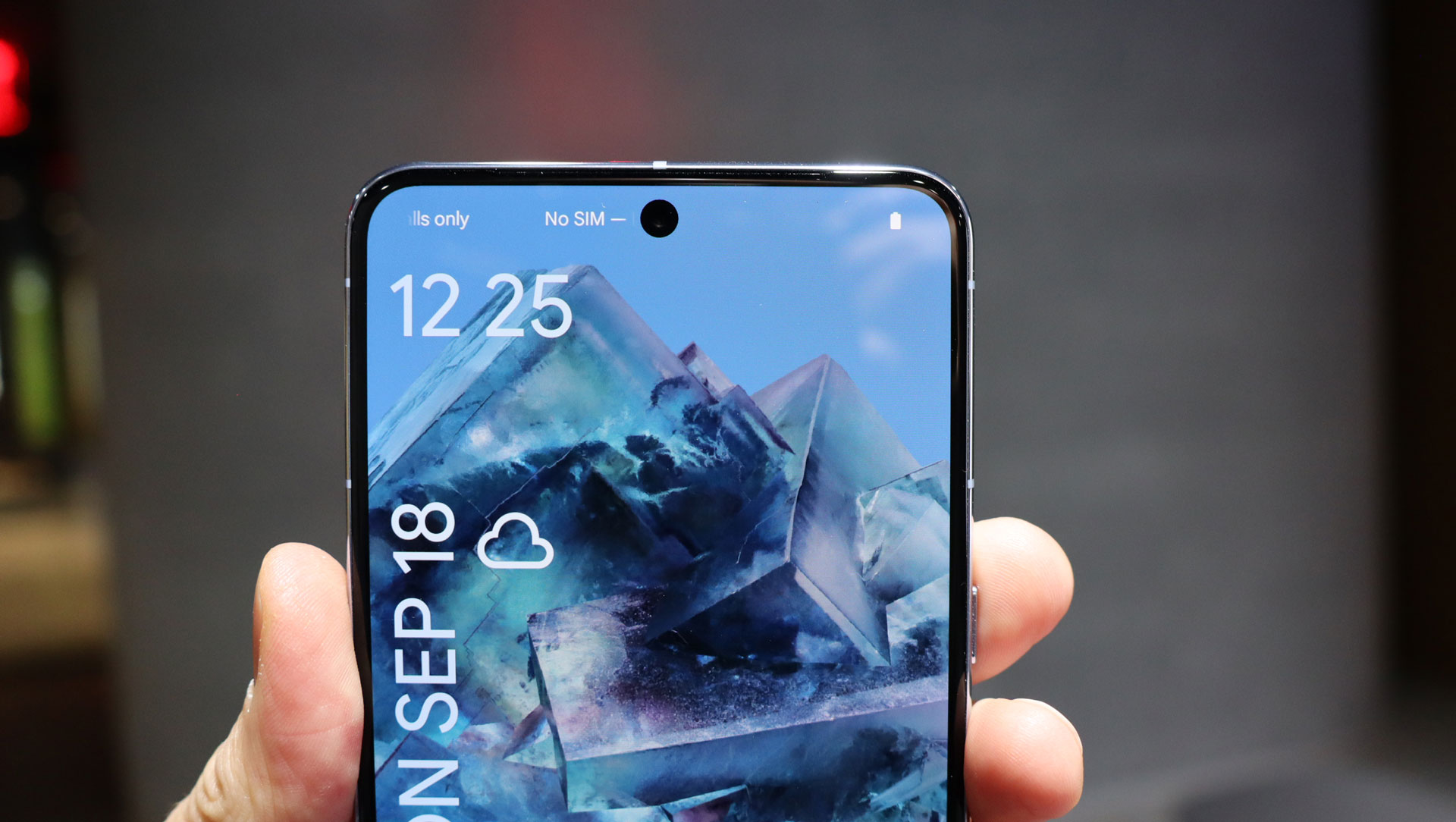
Google Pixel 8 Pro preview: Performance and specs
- New Tensor G3
- Dedicated Titan M2 security coprocessor
Google’s home-grown processors have not exactly set the world on fire, lagging well behind the best from Qualcomm and Apple. Things may be different, though, with the new Tensor G3. The ARM V9 SoC has a new CPU and GPU, plus local Tensor processing units (TPUs), while the phone can tap into cloud-based TPUs on demand.
We don’t have any performance numbers for the chip yet, but do expect it to power much of the Pixel 8 Pro’s AI capabilities.
Those capabilities, some which are coming with the phone and some post launch, include onboard large language model (LLM) capabilities in Google Assistant. It’ll be able to summarize web pages (like a recipe), or read aloud from a variety of text sources, even converting to another language on the fly.
Google’s Call Screening also gets an update, with a much more natural-sounding voice. In a demonstration, a Google rep, acting as a delivery person, called a Pixel 8 Pro that was set to screen calls. The Pixel 8 Pro answered, and we explained that we had a package to deliver. On the Pixel 8 Pro, we were able to type a note telling the delivery person they could leave the package by the door, and the Pixel 8 Pro relayed that message in its normal-sounding voice. If the voice hadn’t identified itself as a personal assistant, I would never have known it was an AI.
Google Pixel 8 Pro preview: Software
- Android 14
- On-board AI
- 7 years of OS and security updates
If the formidable specs and the novel temperature sensor don't attract you, perhaps Google can turn your head with its startling support promises, which now include seven years of security and OS updates.
Not only will the Pixel 8 Pro come running Android 14 out of the box, it will have a lengthy lifespan thanks to more than half a decade of operating system updates. Seven years of updates beats the likes of Apple, Samsung, and OnePlus.
Google Pixel 8 Pro preview: Battery
- Big 5,050mAh battery
- Fast wireless charging
It's nice to see Google pushing the limits when it comes to battery capacity – at 5,050mAh the Pixel 8 Pro has one of the largest batteries among flagship phones.
While I haven't tested the battery life, I would expect the Pixel Pro 8 to last 24-to-27 (think just looping video) hours on a charge, and probably close to 20 hours with mixed use.
The Pixel Pro 8 (and Pixel 8) supports Qi-based fast wireless charging and Battery Share. Wired charging for the Pixel 8 Pro has been bumped up to 30W fast charging.
Google Pixel 8 Pro preview: Early verdict
Overall, the Google Pixel 8 Pro looks like a strong update. It faces formidable competition in form of the Samsung Galaxy S23 Ultra and the new Apple iPhone 15 Pro Max. I doubt it will match those handsets for sheer performance, but the cameras, and the AI tools behind them, could set it apart.
We'll know more when we've put the phone through our exhaustive full review process, so stay tuned.
0 comments:
Post a Comment